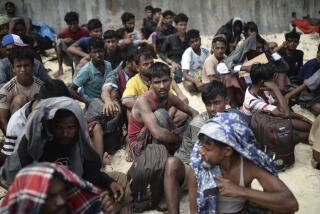Sri Lankan Boats Bar Indian Relief Fleet
- Share via
COLOMBO, Sri Lanka — An Indian fishing fleet carrying relief supplies for Sri Lanka’s besieged Tamil minority faced Sri Lankan gunboats at sea for five hours Wednesday and then turned back, officials said.
Neither side agreed to board one of the other’s vessels, so negotiations were conducted by shouting across the water, said Gopalswami Parthasarthy, an Indian Foreign Ministry spokesman. The ministry condemned rejection of the aid by Sri Lanka, the island nation off the southern tip of India.
Sri Lankan vessels blocked the 19 fishing boats, which flew Indian Red Cross flags, from entering territorial waters. The relief flotilla was accompanied across the Palk Strait by an Indian coast guard ship carrying 124 journalists and Red Cross officials.
Sri Lankan spokesmen said that D.K. Maitra, a senior Indian government official, tried in vain to obtain passage for the boats to Jaffna, the Tamil-dominated northern peninsula that has been under siege by the army for nine days.
The military sweep is directed against strongholds of Tamil guerrillas, who have fought a four-year war for an independent homeland in northern and eastern Sri Lanka that has cost 6,000 lives.
India, from which the Tamils came centuries ago, says it wants to help civilians caught in the war. But Sri Lankan officials rejected the offer.
About 50 million Tamils live in southern India, more than three times Sri Lanka’s total population. India plays an ambiguous role in the Sri Lankan conflict, often acting as mediator but also serving as exile headquarters for militant Tamil organizations.
Tamils, most of whom are Hindus, make up 18% of Sri Lanka’s 16 million people and charge that they are discriminated against by the predominantly Buddhist Sinhalese majority.
Lalith Athulathmudali, Sri Lanka’s national security minister, said of Wednesday’s face-off: “Good sense has prevailed. We decided to stand firm but be polite.”
India’s Foreign Ministry said in a statement that the government “strongly condemns the action by Sri Lankan gunboats in forcibly preventing” passage and accused authorities of “denying the people of Jaffna their basic human rights” by continuing an economic blockade of the peninsula.
It said India would not “remain indifferent . . . to the plight of the people of Jaffna, many of whom . . . have fled their homes to seek safety and refuge in India.”
The fishing fleet was carrying 38 tons of food, medicine and other supplies from India. Sri Lanka denied that people are starving in the north and said it does not need the supplies.
Sri Lanka imposed an economic blockade on the Jaffna Peninsula, where most Tamils live, five months before launching the military campaign last week.
In a statement Wednesday, the National Security Ministry in Colombo said India should give the relief supplies to people in its own southern Tamil Nadu state, where “starvation is rampant.”
Sri Lanka said the Indian aid fleet violated its sovereignty.
Prime Minister Rajiv Gandhi of India had more than 70 Indian and foreign journalists flown to the small southern port of Rameswaram on Monday to accompany the relief fleet, without waiting for word that Sri Lanka would welcome it.
His government paid each fisherman the equivalent of $192 for the trip.
On Tuesday, Sri Lanka threatened to attack the flotilla. On Wednesday, as the boats set out, the Cabinet issued a statement saying, “No person shall be permitted to land, or goods to be unloaded, except under the directions given by the Sri Lankan government.”
A Foreign Ministry official added privately, however, that “the navy has been given strict orders not to fire.”
Gandhi has been under increasing political pressure in India for military intervention in Sri Lanka, formerly Ceylon, to halt killings of Tamils.
Government reports issued in Colombo put the death toll in the current military campaign at more than 300, but India and Tamil groups say the number is about 1,000.
More to Read
Sign up for Essential California
The most important California stories and recommendations in your inbox every morning.
You may occasionally receive promotional content from the Los Angeles Times.













